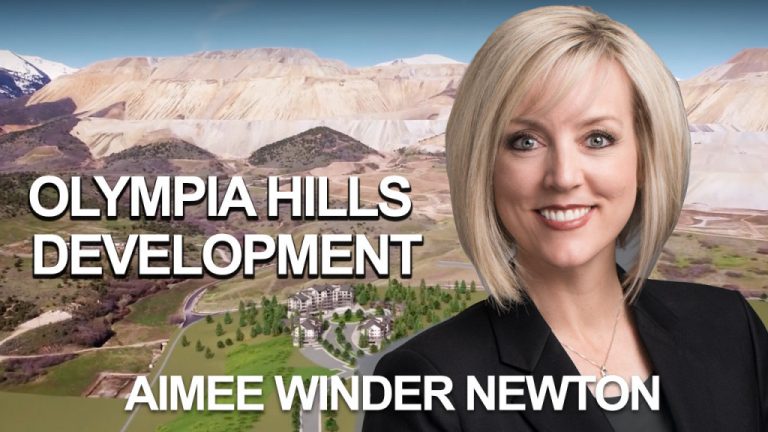“Spread out over 933 acres tucked up against the rolling Oquirrh foothills,” is the proposed and now approved Olympia Hills master planned community.
It’s a proposal that appears similar to Daybreak, where they justify their high-density–over six thousand homes– by stating it will be a “live, work and play community.”
LISTEN TO THE PODCAST:
WATCH THE VIDEO:
However, Olympia Hills in West Herriman is in the boonies. There are no major arteries to connect the development to I-15, except the already congested Bangerter Highway and while it’s a nice dream that everyone living there will stay there, it is far more likely these residents will need to commute to a job somewhere else along the Wasatch Front. Mayors of nearby Herriman, Riverton, Copperton, and West Jordan fought approval of the project last June, claiming they had not been adequately included in its review. Former Salt Lake County Mayor Ben McAdams then vetoed the change of zoning for the project.
But developers can be persistent and they can hire PR companies to help. Love Communications made a beautiful three-minute video incorporating the history of the former mining town of Hatch, Utah. Developers also donated land to USU to open an extension campus; proposed trails for hikers and mountain bikers which lead to the Oquirrh Mountains; a lake and open space offering parks; and buzzwords like “walkable communities”; ideas to attract high-end retailers and high-tech jobs. And, low and behold the project was approved by the Salt Lake County Council 6-3.
This was much to the chagrin of Utah For Responsible Growth a non-profit group spearheaded by area residents who complain that the project will only add to the existing traffic problems from the growing Herriman, Eagle Mountain, and Southwest Salt Lake County. County Council Member and Gubernatorial candidate Aimee Winder Newton said that the area already has a backlog of development projects, and green-lighting this would be a big mistake.
Utah For Responsible Growth is led by Lorin Palmer. The non-profit was on their way to gathering the necessary signatures to get a ballot referendum, but then Coronavirus hit and put their efforts to get petitions signed before the deadline in jeopardy.
The State Legislature already changed the law requiring more signatures in the population to get ballot initiatives passed, but it was the requirement that even with allowing electronic signatures, those signing ballot initiatives would be required to send in the entire initiative packet for their signature to be counted. This law change appeared just ten days before their signatures were due. This would have required Palmer and Utah for Responsible Growth to print “four million sheets of paper,” he said in a video he posted on his website and on YouTube.
Aimee Winder Newton was one of three in the Salt Lake County Council to vote against the Olympia Hills project. She said on the Utah Stories Show, “To me it just doesn’t make sense. If we are going to do high-density it needs to be transit-based….While developers lick their chops when they consider the money they can make with high-density development, this one is too far from I-15.” She concluded that it’s the taxpayers of Salt Lake County who end up footing the bill for projects like this because more extensive freeways and road networks will be required, which will put taxpayers on the hook.
Palmer says that he and Utah for Responsible Growth have concluded their efforts to fight against this project but they will continue to work for the best interests of smart growth in Salt Lake County.
RELATED STORIES:
Salt Lake City Must Decide If We Are Smart Enough for Smart Growth with Soren Simonsen
Babs DeLay: Utah’s Housing Market Suffers Under The Weight of California Migrants
Suburban Sprawl in Utah– its effect on Utah Farmers







